Evolution of Stud Bolts: Meeting Modern Industrial Needs
Nov . 22, 2024 09:09 Back to list
Evolution of Stud Bolts: Meeting Modern Industrial Needs
In the world of fasteners, stud bolts have been essential for applications that require durability and precision. The evolution of these bolts, particularly double-end stud bolts, has led to significant advancements in design and material technology, making them indispensable in modern industries. With various grades like Grade 8.8 stud bolts and Grade 4.8 stud bolts, today’s options cater to specific requirements for strength, flexibility, and resilience.

What Are Double-End Stud Bolts and Their Role in Industry?
Double-end stud bolts have threads on both ends, making them incredibly versatile for industrial applications that require secure fastening from both sides. These bolts are designed for situations where two parts need to be fastened securely and disassembled with ease. Unlike traditional bolts that have heads, double-end studs are threaded on each end, allowing them to join components more flexibly.
The evolution of double-end stud bolts reflects a shift toward adaptability in the industrial world. They can withstand high-stress environments due to their design, which evenly distributes force along the entire bolt. This distribution makes them ideal for critical applications in sectors like automotive, machinery, and construction.
Material Grades: Comparing Grade 8.8 Stud Bolts and Grade 4.8 Stud Bolts
Material grades are essential when choosing the right stud bolt for an application. Grade 8.8 stud bolts are high-tensile bolts made from medium-carbon steel, quenched and tempered to provide superior strength. These bolts are ideal for heavy-duty applications where the fastener must endure significant stress. Due to their high tensile strength, Grade 8.8 bolts are commonly used in structural and mechanical applications that demand durability and longevity.
In contrast, Grade 4.8 stud bolts are less robust but highly versatile. They are typically used in light to medium applications, such as assembling lightweight machinery or in construction projects that don’t demand extreme strength. With a lower tensile strength than Grade 8.8 bolts, Grade 4.8 bolts are affordable yet effective, making them suitable for projects with minimal stress requirements.
Technological Advances in Double-End Stud Bolts for Enhanced Performance
Recent technological advancements have improved the design and function of double-end stud bolts significantly. Innovations include refined threading techniques, material coatings for corrosion resistance, and precision manufacturing. One key advancement is in the threading process, where uniform and precise threads enhance the bolt’s ability to carry heavy loads without loosening over time. Modern double-end studs are also produced using heat-treated, high-strength steel, ensuring that they retain their form and strength even under extreme conditions.
Another notable development is in the coatings used on these bolts, which include zinc and other anti-corrosive layers. These coatings increase the lifespan of the bolts, making them suitable for harsh environments where exposure to moisture, chemicals, or high temperatures is common. This evolution in material science has made double-end stud bolts more reliable and adaptable, extending their usability across a wide range of industries.
Benefits of Using Double-End Stud Bolts in Modern Industry
The design of double-end stud bolts offers several advantages for contemporary industrial applications. First, their double-threaded feature allows for faster installation and removal, reducing downtime and increasing efficiency. This is especially beneficial in industries like automotive and manufacturing, where time is of the essence.
Additionally, double-end studs distribute loads more evenly than single-threaded bolts, enhancing stability and reducing the risk of structural failure. The use of Grade 8.8 stud bolts in particular is advantageous in heavy-duty applications that demand strength and resilience. Meanwhile, Grade 4.8 stud bolts offer a cost-effective solution for lighter tasks, making them ideal for projects with a smaller budget or where high tensile strength is not a critical factor.
Selecting the right stud bolt—whether a standard stud, double-end stud bolts, or specific grades like Grade 8.8 stud bolts and Grade 4.8 stud bolts—is crucial for meeting the requirements of modern industrial applications. The evolution in bolt technology has provided consumers with options that cater to a range of needs, from lightweight assemblies to heavy-duty, high-stress environments.
Understanding the strengths and limitations of each type and grade will help you make an informed choice for your project. Explore our collection of high-quality double-end stud bolts and other fastening solutions that incorporate the latest in durability and design innovation, tailored to meet the demands of today’s industries.
Latest news
-
The Role of Tempering In B7 Stud Bolts
NewsJun.24,2025
-
Salt Spray Resistance of Black Oxidation Hex Bolts
NewsJun.24,2025
-
Heat Treatment for High Strength Hex Bolts
NewsJun.24,2025
-
GB Hex Bolts Manufacturing Quality Control
NewsJun.24,2025
-
Corrosion Resistance of Uncoated Carbon Steel Hex Bolts
NewsJun.24,2025
-
Common Uses of Plain Hex Bolts in Construction
NewsJun.24,2025
